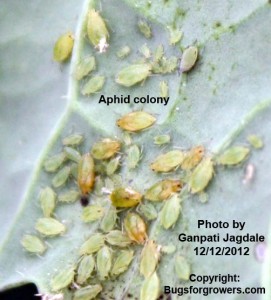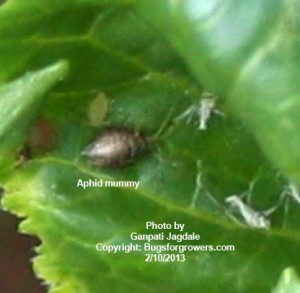Seven facts about an Aphid Killer Aphidius colemani wasp-Bugsforgrowers
1. What are Aphid Killer Aphidius colemani wasps
Aphid Killer Aphidius colemani wasps are tiny insects that are parasitic to over 40 species of aphids (Fig. 1) in the nature. Aphidius colemani wasps are about 2-3 mm long and slender bodied with yellowish colored abdomen and legs, and black colored head and thorax. These aphid killer wasps are commercially available and considered as the excellent biological control agent in controlling different species of aphids that cause a serious damage to many economically important crops grown in the greenhouses, fields, organic vegetable gardens and orchards.

2. Aphid killer wasps, Aphidius colemani are effective against following species of aphids
- Cotton aphid, Aphis gossypii
- Green peach aphid, Myzus persicae
- Melon aphid, Aphis gossypii
3. Key factors influences effectiveness of aphid killer wasp, Aphidius colemani
- For effective control of aphids, release 1-2 adults of aphid killer wasp Aphidius colemani per square meter of aphid infested area.
- Aphid killer wasp, Aphidius colemani adults are attracted to the colonies of aphids by responding to smell of honeydews secreted by aphids on the infested plants.
- Aphid killer wasp, Aphidius colemani adults are very active searchers of their aphid hosts even at very low population densities.
- When females of Aphidius colemani wasp find appropriate size aphids, they lay eggs into the aphid body.
- Then eggs hatch inside the aphid and the hatched larvae start feeding and developing into pupae and then as adult.
- This parasitized aphid then bloat, dies and its body becomes crispy that referred to as mummy.
- After 14- 15 days, adult wasps will start emerging from mummies and life cycle continues.
- If ants are present on aphid infested plants in your garden or greenhouse, control them first before releasing Aphidius colemani wasps as ants will defend aphids from predators and parasites to protect their honeydew food. If ants are not controlled, effectiveness of wasps as a parasite will be reduced.
- Aphidius colemani wasp performs better against aphids when aphid population is at very low level in the garden.
- The preventive applications of Aphidius colemani will prevent out-break of certain species of aphids.
4. How Aphidius colemani are applied in the greenhouses or fields
- Aphidius colemani are generally shipped as ready-to-emerge mummies (containing wasp pupae) in small vials.
- When package is arrived and you are not ready to release Aphidius colemani wasps in your garden, store packages in a cool place and avoid direct exposure to sunlight.
- It is always better to release these wasps in the field within 15-20 hours of their arrival or storage.
- As a preventive measure, try to release adult wasps that are already emerged from mummies by opening vials and walking slowly in the garden. Adult wasps should escape themselves from the vials. Then randomly place the un-hatched mammies in shaded areas in the garden.
- As a curative measure, aphid mummies or hatched adults should be released directly in the aphid colonies or in the heavily infested areas with aphids in the vegetable gardens, greenhouses or fields.
- Under favorable environmental conditions and if there is enough food around, these parasites may recycle continuously and help to keep the aphid population under economic threshold level.
5. How Aphidius colemani wasps work in the greenhouses or fields
- Aphidius colemani are generally shipped as ready-to-emerge mummies (Fig. 2) in vials.
- When aphid mummies containing wasp pupae are applied in the vegetable gardens, greenhouses or fields, adult wasps immediately start emerging from aphid mummies. Sometime you may notice that some wasp adults are already emerged from mummies during transit meaning they are ready to release in the aphid infested areas.
- Emerged adults of Aphidius colemani will be attracted to aphid colonies by responding to smell of honeydews secreted by aphids on the infested plants.
- When adult wasps come across to aphid colonies, they will select a suitable size aphid using their antennae to lays in aphid’s body.
- Once an appropriate size aphid is found, adult wasp using its ovipositor lays eggs inside aphid body.
- Wasp eggs hatch within the aphid body and hatched young larvae start feeding on the body content of aphid, complete its development and pupate within the aphid body.
- The parasitized dead aphids will then turn into crispy mummies (Fig. 2), which are commercially sold to use as beneficial insects to manage population of aphids in your garden.
- After 14- 15 days, adult wasps will start emerging from mummies and life cycle continues

Fig. 2. An aphid mummy formed due to parasitization of Aphid Killer Aphidius colemani wasps .
6. Why you need Aphidius colemani wasps
- they can reduce the crop damage by parasitizing and killing various species of aphids, which are responsible for the crop damage
- they can parasitize and kill all different stages of their aphid hosts
- they are able to actively search for their aphid hosts, parasitize and kill them
- they can reproduce and continue their life cycle on aphids in your garden after first application
- they are commercially available and easy to apply in the greenhouses or fields
7. Why parasitic wasps are safer than traditional pesticides
- they do not cause any damage to plants
- they can be used and applied around children and pets
- they do not cause any harm to the personnel involved in their production and application
- food products are safe to handle and eat when they are treated with wasps
- they do not harm humans, animals and pollute the environment
Research Papers
- Van Driesche, R. G., Lyon, S., Sanderson, J. P., Bennett, K. C., Stanek, E. J., III and Zhang, R.T. 2008. Greenhouse trials of Aphidius colemani (Hymenoptera: Braconidae) banker plants for control of aphids (Hemiptera: Aphididae) in greenhouse spring floral crops. Florida Entomologist 91: 583-591.
